National Register of Historic Places listings in Kenosha County, Wisconsin
This is a list of the National Register of Historic Places listings in Kenosha County, Wisconsin.
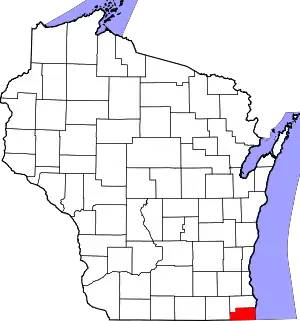
Location of Kenosha County in Wisconsin
This is intended to be a complete list of the properties and districts on the National Register of Historic Places in Kenosha County, Wisconsin, United States. Latitude and longitude coordinates are provided for many National Register properties and districts; these locations may be seen together in a map.[1]
There are 29 properties and districts listed on the National Register in the county. Another two properties were once listed but have been removed.
- This National Park Service list is complete through NPS recent listings posted January 29, 2021.[2]
Current listings
| [3] | Name on the Register[4] | Image | Date listed[5] | Location | City or town | Description |
|---|---|---|---|---|---|---|
| 1 | Barden Store | November 12, 2020 (#100005752) |
622-628 58th St. 42°35′00″N 87°49′09″W |
Kenosha | ||
| 2 | Barnes Creek Site | July 20, 1977 (#77000032) |
Address Restricted |
Kenosha | Prehistoric site occupied from Paleo-Indian to historic times. The remains of at least 5 adults have been found at the site with copper items including a tubular bead and an awl, all stained with red ochre. A slate gorget was found apart from the burials, and various points and ceramic fragments.[6] | |
| 3 | Boys and Girls Library | 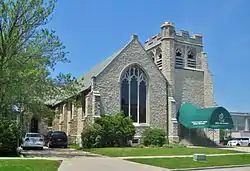 Boys and Girls Library |
October 24, 1980 (#80000144) |
5810 8th Avenue 42°34′57″N 87°49′14″W |
Kenosha | Neogothic-style Unitarian church built in 1907. Bought by the city in 1926 to become a children's library, then reclaimed as a Unitarian church in 1993. |
| 4 | Chesrow Site |  Chesrow Site |
November 30, 1978 (#78000109) |
Western side of Highway 32, 2 miles (3.2 km) north of the Illinois line[7] 42°31′16″N 87°49′27″W |
Kenosha | Site on a beach of Glacial Lake Chicago where ancient people heated chert cobbles to produce projectile points.[8] |
| 5 | Civic Center Historic District | 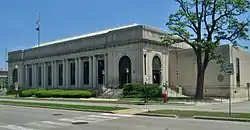 Civic Center Historic District |
July 26, 1989 (#89000069) |
Roughly bounded by 55th Street, 8th Avenue, 58th Street, and 10th Avenue 42°35′04″N 87°49′19″W |
Kenosha | Group of six Neoclassical-styled public buildings around Civic Center Park. |
| 6 | Anthony and Caroline Isermann House | 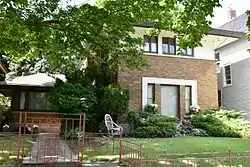 Anthony and Caroline Isermann House |
February 25, 2004 (#04000108) |
6416 Seventh Avenue 42°34′33″N 87°49′08″W |
Kenosha | 1922 2-story Prairie Style house designed by Russell Barr Williamson. Anthony and his brother ran a clothing business. |
| 7 | Frank and Jane Isermann House | 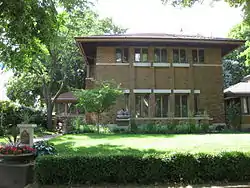 Frank and Jane Isermann House |
February 25, 2004 (#04000107) |
6500 Seventh Avenue 42°34′33″N 87°49′08″W |
Kenosha | 1923 2-story Prairie Style house designed by Russell Barr Williamson. |
| 8 | Kemper Hall | 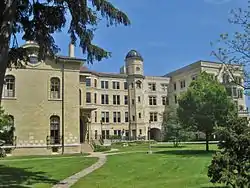 Kemper Hall |
June 7, 1976 (#76000067) |
6501 Third Avenue 42°34′35″N 87°48′50″W |
Kenosha | Episcopal college complex started from Charles Durkee's 1861 Italianate-styled mansion and gradually expanded with various Gothic Revival additions. |
| 9 | Kenosha County Courthouse and Jail | 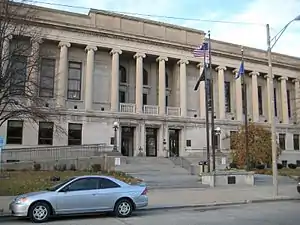 Kenosha County Courthouse and Jail |
March 9, 1982 (#82000677) |
912 56th Street 42°35′06″N 87°49′23″W |
Kenosha | Neoclassical-styled courthouse built 1923 to 1925. |
| 10 | Kenosha Elks Club | .jpg.webp) Kenosha Elks Club |
November 13, 2017 (#100001815) |
5706 8th Ave. 42°35′01″N 87°49′15″W |
Kenosha | 4-story Georgian Revival brick Elks' meeting hall designed by R. Messmer and built 1917 to 1919. |
| 11 | Kenosha Light Station | 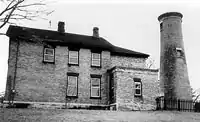 Kenosha Light Station |
June 28, 1990 (#90000995) |
5117 Fourth Avenue 42°35′23″N 87°48′57″W |
Kenosha | Lighthouse and keeper's house built in 1866 on Simmons Island, north of the channel into Kenosha's harbor. |
| 12 | Kenosha North Pierhead Light | 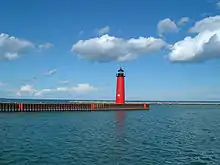 Kenosha North Pierhead Light |
June 24, 2008 (#08000545) |
North pier at Kenosha harbor entry, 0.1 mile east of Simmons Island Park 42°35′20″N 87°48′31″W |
Kenosha | 50-foot lighthouse with cast iron walls, situated on the far end of the pier that guards the entrance to Kenosha's harbor. |
| 13 | Library Park | 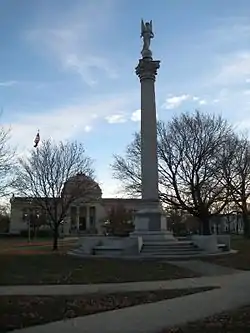 Library Park |
June 22, 2000 (#00000733) |
711 59th Place 42°34′50″N 87°49′11″W |
Kenosha | Set aside in 1838 to be a town common, the public area has evolved into a city park "romantically" landscaped by Ossian Cole Simonds and containing a library and war memorial designed by Daniel Burnham. |
| 14 | Library Park Historic District | 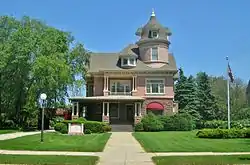 Library Park Historic District |
November 29, 1988 (#88002657) |
Roughly bounded by 59th Street, 7th Avenue, 61st Street, and 8th Avenue 42°34′50″N 87°49′09″W |
Kenosha | Historic neighborhood surrounding Library Park, containing 42 contributing homes built from 1843 to 1930 in a variety of styles. |
| 15 | Lucas Site | February 24, 1995 (#95000136) |
Address Restricted |
Pleasant Prairie | Another archeological site on what was the plain of Glacial Lake Chicago, which has produced heat-treated points, chipped stone, and bone fragments similar to Chesrow. Occupation could have been from 4000 to 12400 BP.[9] | |
| 16 | Manor House | 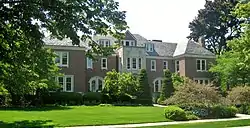 Manor House |
October 29, 1980 (#80000145) |
6536 Third Avenue 42°34′28″N 87°48′55″W |
Kenosha | 2.5-story brick mansion with ballroom, servants' quarters, and formal garden, designed by Pond and Pond and built in 1926 for James E. Wilson, an executive of Nash Motors. Later the residence of the headmasters of Kemper Hall.[10][11] |
| 17 | John McCaffary House |  John McCaffary House |
January 31, 1978 (#78000110) |
5732 13th Court 42°34′56″N 87°49′35″W |
Kenosha | 2-story cream brick house built in 1842. There in 1850 John MacCaffary drowned his wife Bridget in a backyard cistern. The following year he was convicted of murder. His botched hanging gave the final push toward abolition of the death penalty in Wisconsin.[12][13] |
| 18 | Rosinco | 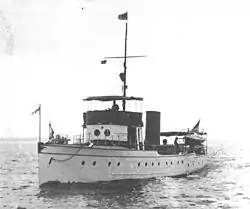 Rosinco |
July 18, 2001 (#01000737) |
12 miles (19 km) east of Kenosha 42°37′30″N 87°38′14″W |
Lake Michigan | 95-foot steel diesel-powered yacht built in 1916 by Harlan and Hollingsworth of Wilmington, Delaware. Sank in 1928 after hitting something in the middle of the night 12 miles east of Kenosha. Now sits 195 feet below the surface. |
| 19 | John P. and Mary Runkel House | March 3, 2020 (#100005013) |
33301 Geneva Rd. 42°34′47″N 88°12′48″W |
Wheatland | Cream brick-clad Italianate-style house with bay window and denticulated, bracketed cornice, built in 1878.[14] | |
| 20 | St. Matthew's Episcopal Church | 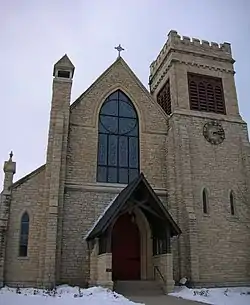 St. Matthew's Episcopal Church |
June 6, 1979 (#79000090) |
5900 7th Avenue 42°34′55″N 87°49′08″W |
Kenosha | Episcopal church designed by A.H. Ellwood in English Gothic Revival style and completed in 1879. Oldest surviving church in Kenosha. |
| 21 | Simmons Island Beach House | 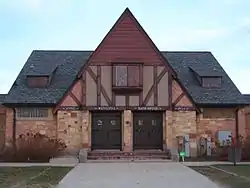 Simmons Island Beach House |
February 20, 2003 (#03000057) |
5001 Simmons Island 42°35′27″N 87°48′51″W |
Kenosha | Tudor Revival structure designed by Chris Borggren, with limestone veneer and half-timbering. Built 1934-35 with help from the FERA and WPA - New Deal agencies. |
| 22 | Gilbert M. Simmons Memorial Library |  Gilbert M. Simmons Memorial Library |
December 17, 1974 (#74000093) |
711 59th Place 42°34′50″N 87°49′10″W |
Kenosha | Fine Classical Revival-styled library with dome designed by Daniel Burnham and completed in 1900. Financed by Zalmon G. Simmons in memory of his son Gilbert. |
| 23 | Southport Beach House | 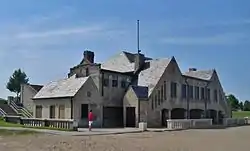 Southport Beach House |
January 8, 2003 (#02001684) |
7825 First Avenue 42°33′41″N 87°48′45″W |
Kenosha | Public dressing rooms and ballroom along Lake Michigan, designed by Christian Borggren in an unusual assortment of styles and constructed in the late 1930s using reclaimed materials and WPA assistance. |
| 24 | Third Avenue Historic District | 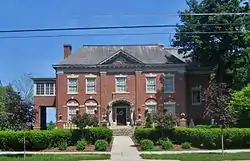 Third Avenue Historic District |
November 1, 1988 (#88002022) |
Along Third Avenue between 61st and 66th Streets 42°34′35″N 87°48′52″W |
Kenosha | Kenosha's "mansion" district of the early 20th century, with large, stylish homes facing Kemper Hall and Lake Michigan. |
| 25 | Vincent-McCall Company Building | 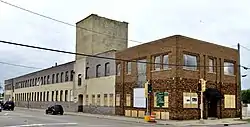 Vincent-McCall Company Building |
March 26, 2018 (#100002235) |
2122 56th St. 42°35′01″N 87°50′06″W |
Kenosha | Factory that manufactured metal springs, started by the Windsor Spring Company in 1900. Later the Vincent-McCall Company expanded the factory and the product line to include mattresses, metal lawn furniture, and steel berths and bunks during WWII.[15] |
| 26 | Washington Park Clubhouse | 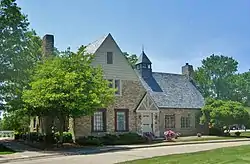 Washington Park Clubhouse |
January 23, 2003 (#02001740) |
2205 Washington Road 42°36′04″N 87°50′11″W |
Kenosha | Tudor Revival-styled clubhouse for a public golf course, designed by Hugo Bothe and completed in 1936 with WPA assistance, built partly with reclaimed materials.[16][17] |
| 27 | Justin Weed House | 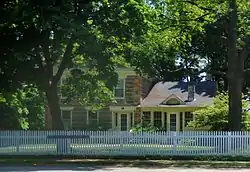 Justin Weed House |
December 3, 1974 (#74000094) |
3509 Washington Road 42°36′09″N 87°51′07″W |
Kenosha | Greek Revival-styled house built by David Warren in 1848, with exterior walls carefully veneered with cobblestones laid in stripes and with brick quoins on the corners.[18][19] |
| 28 | Wehmhoff Mound (47KN15) |  Wehmhoff Mound (47KN15) |
November 21, 1985 (#85002971) |
Along old Highway 83 in the northwestern quarter of Section 26, Township 2 North, Range 19 East[20] 42°36′22″N 88°13′30″W |
Wheatland | Lone effigy of a water spirit. The curvature of the tail is unusual in effigy mounds.[21] Photographed from a plane in 1927, it was only the second known instance of aerial photography for archaeological purposes in the U.S.[22] |
| 29 | WISCONSIN shipwreck (iron steamer) | 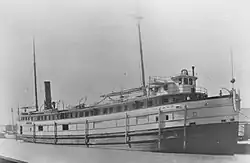 WISCONSIN shipwreck (iron steamer) |
October 7, 2009 (#09000820) |
6.5 miles (10.5 km) south-southeast of Kenosha[23] 42°31′58″N 87°42′31″W |
Kenosha | 204-foot iron package steamer built in 1881 - the first iron craft on the Great Lakes with a double bottom. Served as a hospital ship in WWI. Sank in a storm in October 1929. |
Former listings
| [3] | Name on the Register | Image | Date listed | Date removed | Location | City or town | Summary |
|---|---|---|---|---|---|---|---|
| 1 | Alford Park Warehouse | December 31, 2002 (#02001665) | April 21, 2014 | 1885 Sheridan Road 42°37′19″N 87°49′34″W |
Kenosha | Rustic-styled brick warehouse/gymnasium designed by Hugo Bothe and built in 1938. Destroyed in a 2012 fire.[24][25] | |
| 2 | Kenosha High School | Kenosha High School |
June 6, 1979 (#79003770) | Unknown | 913 57th Street 42°35′00″N 87°49′21″W |
Kenosha | Monumental school building designed in Richardsonian Romanesque style by F.S. Allen and built in 1890.[26] Still listed as a contributing property of the Civic Center Historic District. |
See also
| Wikimedia Commons has media related to National Register of Historic Places in Kenosha County, Wisconsin. |
References
- The latitude and longitude information provided in this table was derived originally from the National Register Information System, which has been found to be fairly accurate for about 99% of listings. Some locations in this table may have been corrected to current GPS standards.
- "National Register of Historic Places: Weekly List Actions". National Park Service, United States Department of the Interior. Retrieved on January 29, 2021.
- Numbers represent an alphabetical ordering by significant words. Various colorings, defined here, differentiate National Historic Landmarks and historic districts from other NRHP buildings, structures, sites or objects.
- "National Register Information System". National Register of Historic Places. National Park Service. April 24, 2008.
- The eight-digit number below each date is the number assigned to each location in the National Register Information System database, which can be viewed by clicking the number.
- David F. Overstreet; Larry Doebert; Gary W. Henschel; Phil Sander; David Wasion (1996). "Two Red Ocher Mortuary Contexts from Southeastern Wisconsin - the Henschel Site (47 SB 29), Sheboygan County and the Barnes Creek Site (47 KN 41), Kenosha County". The Wisconsin Archeologist. 77 (1): 37–40, 44–45.
- "Development, Archaeology Collide on a Muddy Field". Milwaukee Journal 1993-04-11: B3.
- Overstreet, David F. (1998). "Late Pleistocene Geochronology and the PaleoIndian Penetration of the Southwestern Lake Michigan Basin". The Wisconsin Archeologist. 79 (1): 34–39.
- Overstreet. Pages 39, 47.
- "Manor House (James E. Wilson House)". Wisconsin Historic Society. Retrieved 2018-06-21.
- Clifton E. Peterson, M.D.; Diane H. Filipowicz (September 1979). "The Manor House". NRHP Inventory-Nomination Form. US Dept. of the Interior. National Park Service. Retrieved 2018-06-21. With one photo.
- "McCaffary, John, House". Wisconsin Historic Society. Retrieved 2018-06-21.
- Marlene Rockmore; David A. Donath (1976-09-29). "McCaffary, John, House". NRHP Inventory-Nomination Form. US Dept. of the Interior. National Park Service. Retrieved 2018-06-21. With one photo.
- "John P. and Mary Runkel House". Wisconsin Historic Society. Retrieved 2020-03-06.
- "Vincent-McCall Company Building". Wisconsin Historic Society. Retrieved 2018-07-03.
- "Washington Park Clubhouse". Wisconsin Historic Society. Retrieved 2018-07-03.
- Carol Lohry Cartwright (2002-09-05). "Washington Park Clubhouse". NRHP Inventory-Nomination Form. US Dept. of the Interior. National Park Service. Retrieved 2018-07-03. With 12 photos.
- "Justin Weed House". Wisconsin Historic Society. Retrieved 2018-07-03.
- Ellen Threinen; Charlene Engel (1974-08-15). "Weed, Justin, House". NRHP Inventory-Nomination Form. US Dept. of the Interior. National Park Service. Retrieved 2018-07-03.
- Brown, Charles E. "An Airplane Photograph of an Indian Effigy Mound." The Wisconsin Archaeologist 6 (1927): 105-110.
- Khitsun, Andrew. "Wehmhoff Mound". Wisconsin Mounds. Retrieved 2018-06-14.
- "The 1927 Aerial Photography of a Wisconsin Effigy Mound". Retrieved 2018-06-14.
- Location given in Kohl, Cris (2001). The Great Lakes Diving Guide. West Chicago, Ill.: Seawolf Communications, Inc. NRIS lists site as "address restricted".
- "Alford Park Warehouse". Architecture and History Inventory. Wisconsin Historic Society. Retrieved 2018-07-03.
- "Alford Park Warehouse". National or State Register. Wisconsin Historic Society. Retrieved 2018-07-03.
- "Kenosha High School". Architecture and History Inventory. Wisconsin Historic Society. Retrieved 2018-07-03.
This article is issued from Wikipedia. The text is licensed under Creative Commons - Attribution - Sharealike. Additional terms may apply for the media files.